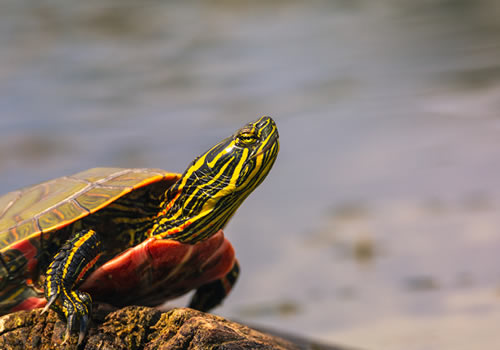“For as long as I can remember, I’ve been interested in nature,” says U of T biologist Ebrahim Lari. “I was always digging holes in the garden looking for creatures. I was the kid who always had snakes and bugs in their bedroom. I drove my mother crazy! On the other hand, my sister never went in my room.”
That childhood passion for nature ultimately led Lari to a postdoctoral fellowship in the Department of Cell & Systems Biology (CSB) in the Faculty of Arts & Science where he has been investigating how western painted turtles survive extremely low levels of oxygen for months without cellular damage and death.
The research is being conducted in the lab of Les Buck, a CSB professor, and for that work, Lari has been awarded a prestigious two-year Banting Postdoctoral Fellowship worth $70,000 per year — the first ever granted to a CSB researcher.
“It feels good,” says Lari about the award. “I take it as an indication that my research is interesting and that I’m heading in the right direction.”

©iStock.com | michaelschober.
The range of the western painted turtle stretches from Ontario to British Columbia, where they are a common sight for cottagers, canoers and campers. The turtles spend the winter in frozen ponds and lakes where the oxygen content of the water can reach zero. Without oxygen, turtles can’t break down sugar to generate energy. So to survive, they reduce their overall activity and curtail processes happening on a cellular level that require energy.
“One of the main consumers of oxygen and energy is the brain,” explains Lari. “So, the turtles reduce neuron activity or shut down some of their neurons so they stop firing. And because they’re not firing, the energy they require is greatly reduced.”
In addition, the turtles shut down oxygen-dependent protein production. They also release calcium into their bloodstream to counteract the rise in acidity of the blood that occurs in the absence of oxygen. And, they remove lactate — a toxic waste product normally disposed of with the help of oxygen — by absorbing it into their shell.
In addition to revealing how turtles achieve this remarkable feat, Lari’s work could provide insights into how other species respond to a variety of environmental stresses such as pollution. It may also have benefits for humans.
“In the short term,” says Buck, “Ebi’s work is focused on discovering the cellular mechanisms that permit vertebrate cells to survive days to months without oxygen. In the long term, it has clear clinical implications for the protection of human tissue from low-oxygen damage — for example, during or following a heart attack or stroke.”
“As we learn what mechanisms turtles use to cope,” says Lari, “we might be able to apply them to heart attack or stroke patients and reduce the damage that happens.”
A life in research
While Lari’s fascination with nature was clear at a very early age, he credits his middle- and high-school experience with the National Organization for Development of Exceptional Talents in Teheran, Iran, for starting him on the path to becoming a researcher.
“My teachers in high school started the whole process,” he says. “We got to explore different subjects and that was the start of my interest in biology. And we got to do research which I really enjoyed. I’ve never stopped loving it.”
An interest in environmental issues developed at the same time. “I had a teacher who was an environmentalist and an active member of Greenpeace in Iran,” he says. “We spent a lot of time talking about biology, research and environmental issues. Our conversations made me worried about the future of the planet and I thought, I have to do something about this.”
That additional passion for the environment led to a PhD in eco-toxicology — a multidisciplinary field that investigates the effects of contaminants on the environment at the organism, population and ecosystem levels.
With the help of the Banting award, Lari says his plan is to push his current research to another level. “Most of our research to this point has been on excitable cells like those found in the brain,” he says. “But now, we’ve also started looking at non-excitable cells and how they tolerate low levels of oxygen.”
If the fellowship is a sign that Lari’s research with turtles is headed in the right direction, it is also a confirmation that his career-related life choices have pointed him down the proper path.
“I had a well-paid teaching position in Iran,” he says. “I was doing well, but I wasn’t as happy as I am now because now, I’m following my passion and doing what I want to do: research.”

